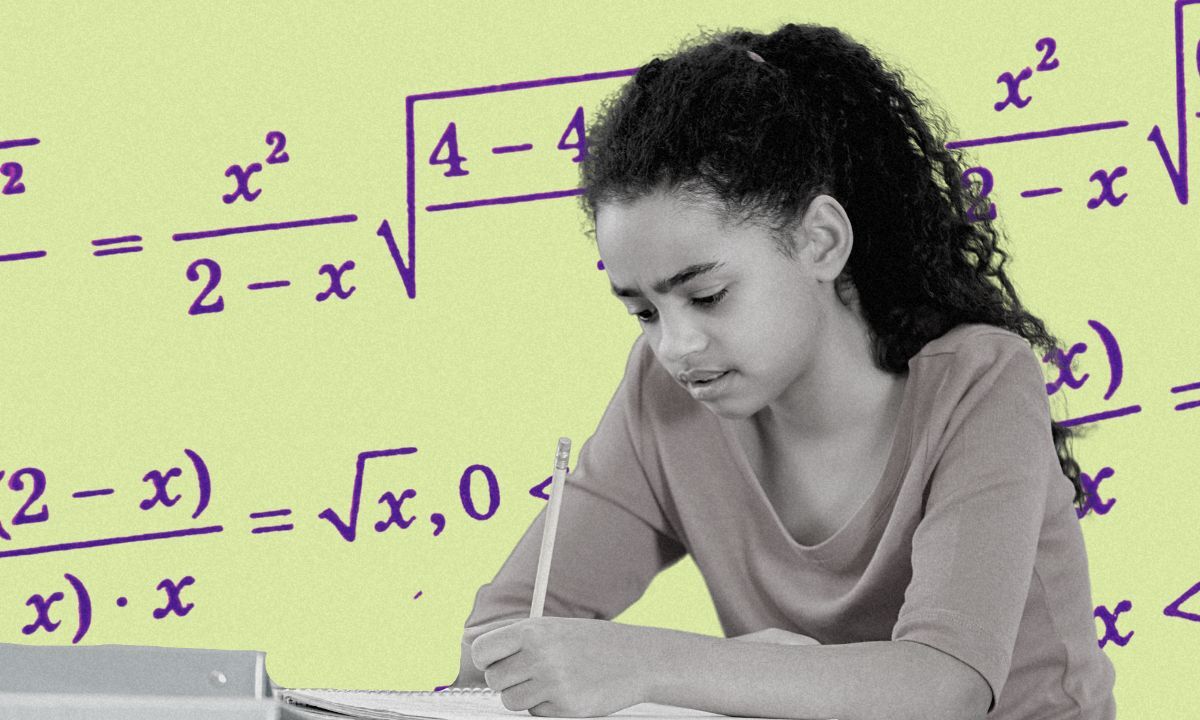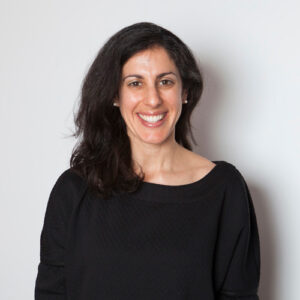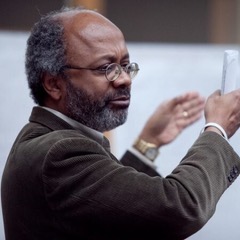Equity Builder or Racial Barrier: Debate Rages Over Role of 8th-Grade Algebra
Some argue it’s necessary for success in high school, college and beyond, while others say its requirement furthers racial inequity

Get stories like this delivered straight to your inbox. Sign up for The 74 Newsletter
Updated, Feb. 25
It’s critical for student success in college and beyond.
It’s an unnecessary barrier meant to keep students of color from higher education.
That’s the argument on both sides of a long-standing debate about algebra.
There is, however, consensus on a few key issues: Race and wealth play a role in how and when the course is offered in K-12 and students’ failure to pass the course by high school or college has long kept them from graduating — and qualifying for high-paying jobs.
They agree, too, that the pandemic, which tanked math scores nationwide and stunted students’ social skills, leading to behavioral problems that continue to hinder learning, has left young people particularly vulnerable.
What they do not agree upon is a solution. While some say schools should double down on the course and offer it to all children starting in the eighth grade, others say it’s time to drop higher-level algebra as a graduation requirement and provide students with another path, one made up of more practical mathematics coursework that would not prohibit them from pursuing their education.

“What is so magical about algebra as a math requirement?” asked Eloy Ortiz Oakley, former chancellor of California’s community college system. It’s a gatekeeper to virtually every type of credential and transfer in higher education, he said, calling it a “killing field” for low-income students and those of color. “One could argue that it is becoming a barrier as soon as eighth grade given the push to make algebra a requirement.”
High school freshman Mia Miron, 14, who currently has a C+ in algebra, doesn’t understand how the subject will help build her career: Miron, who lives in Pomona, California, hopes to become a chef, a hairdresser or to pursue ethnic studies.
“There are some lessons that are harder than others, but I’m not perfect in understanding,” she said. “Math to me is not my favorite subject and I don’t think it could help me in my future.”
While some advocate for universal eighth-grade algebra, many children don’t have access to the course that early: It’s often available only to white, more well-off students based upon test scores, teacher recommendations, previous years’ grades and parent choice — all of which benefit the affluent.
Data obtained by The 74 show that just 31,400 eighth-graders took the Algebra Regents exam in New York City in 2022: 72% passed with a 65 or higher. There were roughly 64,500 eighth graders in the city school system in the 2021-22 school year, excluding those in charters, marking a 48% participation rate.
Nearly 37% of eighth graders in Broward County, Florida, less than 22% in Baltimore City Public Schools and 21% in Phoenix’s Paradise Valley Unified School District were enrolled in the course most recently. In Seattle Public Schools, 37% of eighth graders take algebra, as do hundreds of seventh graders. Many districts only offer the class to eighth graders deemed advanced.
Students in the McAllen Independent School District, for example, must earn roughly 86% on their seventh grade end-of-year state math exam to qualify for a blended math course in which they learn eighth-grade mathematics in the first semester and, if they are successful, algebra in the second. Just 23% of its eighth-grade class is enrolled in the course, district officials told The 74: Administrators there said the number dipped as a result of COVID.
Both Baltimore and New York City schools say they hope to boost participation.
Algebra’s proponents say failure to offer rigorous mathematics coursework early in a child’s educational career is a civil rights violation.

“The relationship between math and science is very strong,” said Talia Milgrom-Elcott, executive director and founder of Beyond100K, a group which aspires to prepare and retain 150,000 new STEM teachers, especially for schools serving majority Black, Hispanic and Native American students, by 2032. “A whole set of careers would be closed off to them — all of which happened to be some of the fastest growing and highest paying. From an equity perspective, it’s almost untenable.”
William Crombie is the director of professional development at The Algebra Project, an organization founded by civil rights icon and mathematics educator Robert P. Moses. The group uses mathematics literacy as an organizing tool to boost the quality of education for American schoolchildren, focusing on the most underserved middle and high school students, who too often also score low on standardized tests.

Crombie said that while algebra is an expected offering for eighth-grade students in “well-to-do, suburban communities,” it’s much harder to find elsewhere. “In urban and even rural high schools, they are struggling to accomplish algebra in the 9th grade.”
But, he said, there is no logical reason to accept the inequity: If wealthy children can learn these concepts, so can others.
“Unless people believe in some very strange distribution of talent in the human species, if that upper decile can do it, it’s incumbent upon us to find the proper opportunities for learning so that all students can do it,” he said.
But Boaz Barak, a computer science professor at Harvard University, said uneven access to rigorous mathematics is just one part of a much larger and persistent problem.
“This is not math specific,” he said, adding a gap in math scores between two groups of students often means a gap in other academic areas, including reading.
And while some might want an alternative pathway, Barak urges against it.
“The problem is that sometimes people try to solve the gap by claiming that the issue is with math itself,” he said. “Then you have counterproductive and harmful policies that try to fix equity by trying to lower the ceiling and remove advanced math options for everyone, or replace them with superficial areas like ‘data science.’”
Such courses, while marketed as alternative pathways, are really “off-ramps” from any quantitative major in college, Barak said. Data science is “a great field,” he added, but for students to grasp the concept, they need a background in statistics, computer science and math: linear algebra and some calculus.
“This means that it can’t be taught properly at the high school level,” he said. “What you can teach is a data literacy course, which teaches you basic tools such as spreadsheets and some notions about plotting data and correlations. The latter is a fine course to teach — but it’s not a math course.”
Both California and New York are changing — and, in some cases lowering — math standards so that students meet basic requirements for high school graduation. The plans are controversial with some saying such modifications will leave students unprepared for the future.
School-aged children are already in the midst of an academic crisis and face dire predictions about their financial futures: They could suffer hundreds of billions of dollars in lost earnings throughout their lifetimes.
Crombie, of The Algebra Project, believes challenging, relevant coursework will help them meet their academic goals: He encourages students to model the importance of mathematics education by serving as math tutors, mentors and advisors to their peers. And his organization wants teachers to have adequate time during the school day — and support during the summer — to work with each other to deepen their understanding of the subject and improve classroom practices.
Schools, the group contends, should give struggling students the tools they need to succeed rather than relying upon older, failed methods.
Teacher training and retention also cannot be ignored, Crombie said.
“The strongest teachers are often pulled out to better-paying suburban districts,” he said.
Ortiz Oakley understands the challenges schools and students face but believes algebra is not the answer. He recognizes the importance of the subject for a calculus-based pathway in math at the high school and college level — and its relevance to STEM.
But what, he asked, is the relevance to the humanities and social sciences?
“That is what we are questioning,” said Ortiz Oakley, who left his community college post last summer to head College Futures Foundation, an equity-focused higher education group. “There is no doubt this is a vestige of exclusionary tactics rooted in racism and discrimination. We’ve seen that repeatedly in this country.”
The Chan Zuckerberg Initiative, Bill & Melinda Gates Foundation, Walton Family Foundation and Carnegie Corporation of New York provide financial support to Beyond100K and The 74.
Get stories like these delivered straight to your inbox. Sign up for The 74 Newsletter

;)
